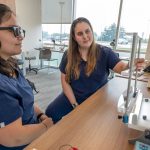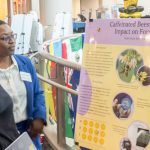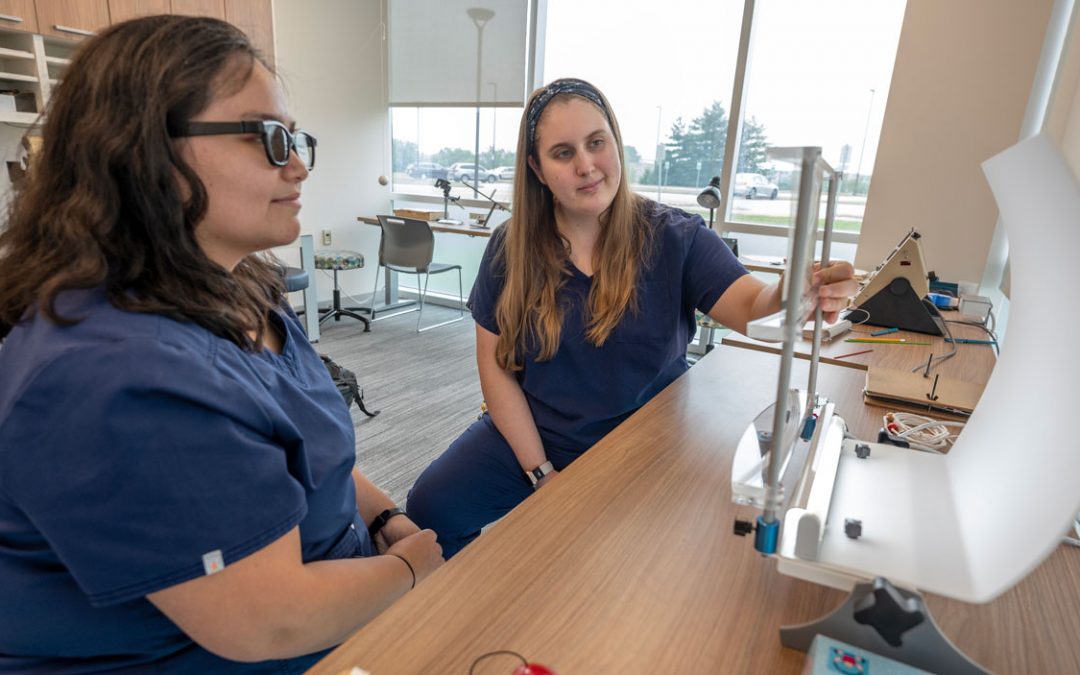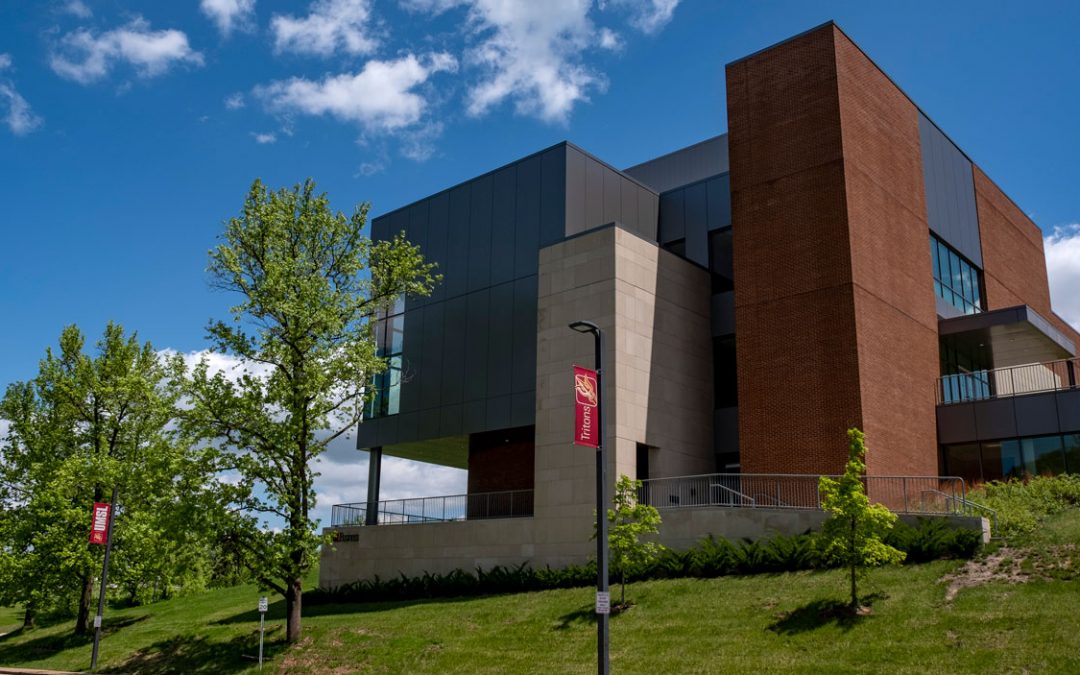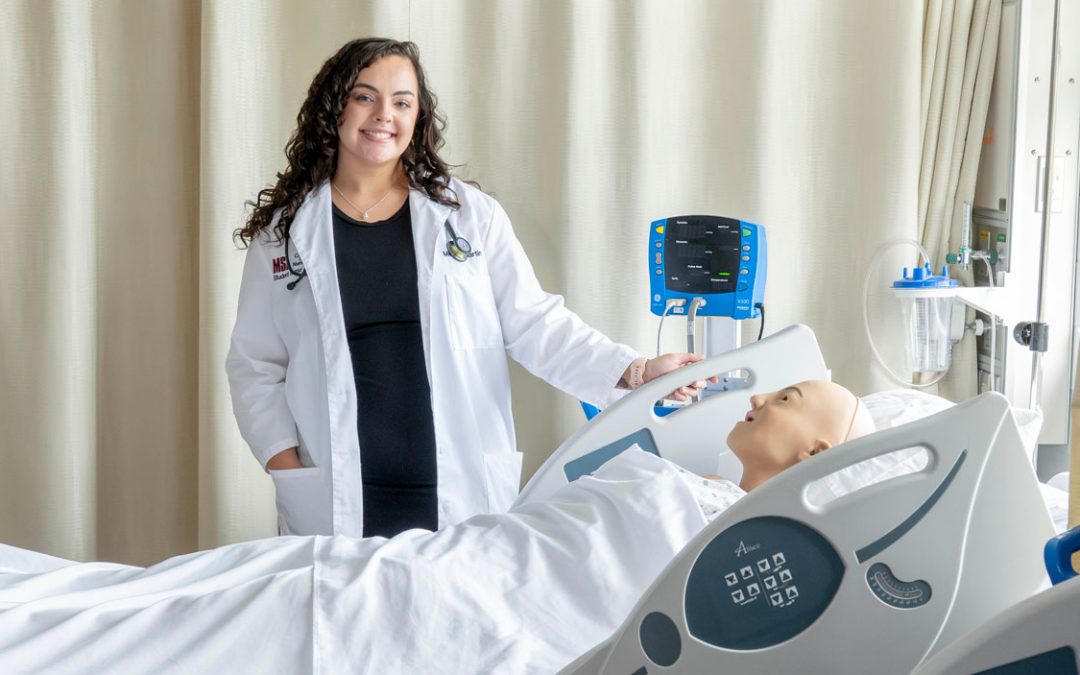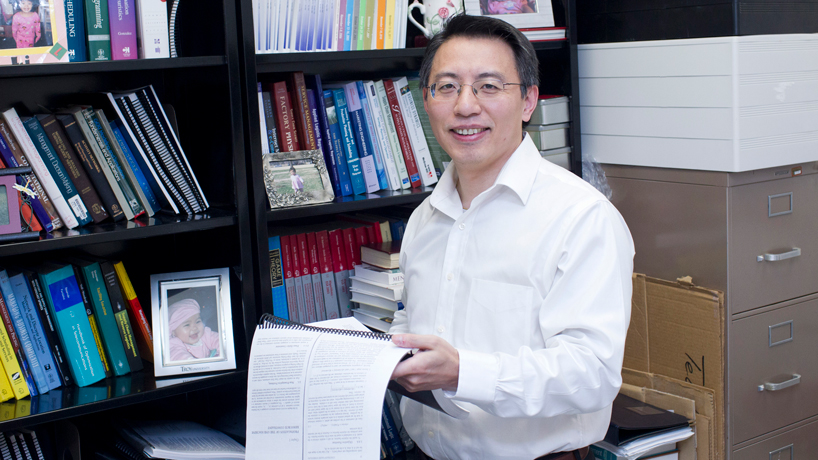
Haitao Li, associate professor of logistics and operations management, is the lead researcher on a resource distribution software that is scheduled for commercialization in 2018. (Photo by August Jennewein)
For many companies, data acquisition is no longer a concern. The problem has transitioned to properly utilizing the daily influx of information.
A professor at the University of Missouri–St. Louis and a team of researchers may have found a solution for this issue that has perplexed project managers for years.
Haitao Li, associate professor of logistics and operations management, is the lead researcher on a software that solves resource allocation and task scheduling issues.
Thanks to a few key factors – funding from the University of Missouri System, cross-departmental support at UMSL and a partnership with a new startup company – commercialization is on track for 2018.
“It looks like it’s going to move forward, which I’m really pleased to see,” Li said. “My passion is to really see my work and research have impactful contributions to society. That’s really gratifying and my ultimate motivation.”
With the goal of maximizing the rate of return, the technology takes contract value, project due date, activity duration-cost tradeoff and complex payment terms as inputs in order to provide optimal decision support on resource allocation and project scheduling. The software tool consists of a user-friendly graphical user interface, database and optimization engine via a mixed-integer programming model and solution method. The server-based architecture allows users to access the tool remotely with user-specific access control.
While currently targeted for the construction industry, the technology has wide application. Li notes that make-to-order manufacturers in particular need a more effective method to manage their large-scale projects. Although current software offers a good starting point, it doesn’t provide an adequate level of data-driven decision support.
“When we talk with companies, they will get tons of data every day, but they are not using it,” Li said. “What we have done is really a step forward to truly utilize the available data about project schedules and needed resources. We use that historical data in our optimization model to make better decisions.”
The idea took off during an intercampus conference designed to gather researchers from across the UM System. In the three years since Li’s initial conversation with Ceki Halmen, associate professor of civil engineering at University of Missouri–Kansas City, the software has received key system support – Interdisciplinary Intercampus Funding and Fast Track Funding.
During the academic stage, Li began working with UMSL’s Technology Transfer Office to oversee the patent applications and possible copyright registrations. The TTO, under the direction of Tamara Wilgers, then marketed the idea to entrepreneurs and established companies for commercialization.
“We have an excellent Technology Transfer Office that has been very helpful to me during the process,” Li said. “A researcher alone cannot do this by him or herself. That is just not our area. But once we have the technology, we need help to find interested parties to organize those communications and help with the patent application.”
The software has caught the eye of Academic Technology Ventures, which formed On Target Scheduling, a startup company tasked with bringing the product to market.
“Our solution is solving real-world problems in resource management, supply chain design and logistics to save companies both time and money in complex industrial projects,” said ATV Founder and Chair Corey Park.
Li also received significant student support throughout the process. Dorothy Yang, a PhD student at that time, assisted with the model formulation. Later in the project, alumnus Teddy Chen helped with prototype development. The technology also benefits from Li’s years of collaboration with Hewlett-Packard and the Army Research Office.
For UMSL, one of the benefits of commercialization will be license revenue, as it is distributed among inventors, inventors’ departments, the UM System and UMSL’s TTO.
“I truly hope this is only going to be a start,” Li said. “I look forward to working on some even more interesting and more impactful projects. Hopefully that leads to further benefits to the university.”
Li’s work follows the UM System’s 39th national ranking for the Best Universities for Tech Transfer by the Milken Institute.
“The system is very committed to commercialization and economic development,” Wilgers said. “Economic development is the most recent addition to the university mission, and the university strongly supports these efforts that bring faculty innovations to market, particularly through new ventures such as On Target Scheduling.”
As Li continues his project scheduling research, he hopes to emphasize the importance of data-driven decision making during this rapid technology growth era.
“This is really what we need – a better way of making decisions,” Li said. “This is exactly where operations and analytics researchers can help.”



